Sir Alex Ferguson: The secrets behind his success
- Published
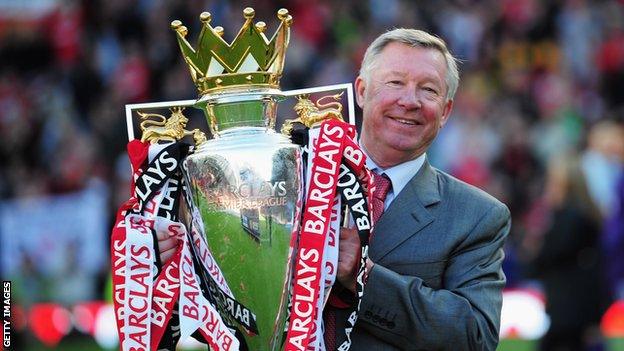
Sir Alex Ferguson won 38 trophies with Manchester United, including 13 Premier League titles
Remember the geese. As mantras for success go, it hardly sets the pulse racing. But to British football's most successful manager - and to those smart enough to listen to him - it is one of the keys to success.
During 26 trophy-laden years at Manchester United, Sir Alex Ferguson would often stop training and tell his players to look to the sky and observe the aforementioned waterfowl as they flew overhead.
He would point out the V formation, that this was a snapshot of a 4,000-mile journey during which each bird would take its turn at the front, part of one perfect machine designed to achieve a single goal.
Finally, he would add: "Now if they can do that, you can give me 38 games to win the league."
Sir Michael Moritz, venture capitalist and co-author of 'Leading' with Ferguson |
|---|
"He could be the father confessor, the motivational speaker, the priest, the judge, the jury, the Lord High Executioner, the puppet master and the inspirational figure all in the course of one day." |
This simple symbol for team work is just part of what makes Ferguson a great leader and why his influence stretches far beyond football, into other sports and the worlds of business, the military and politics.
On Sunday, 11 October, BBC One will screen a new documentary in which former BBC political editor Nick Robinson talks to those who have learned from Ferguson, as well as the man himself, to uncover the secrets of his success, as well as his views on those white Liverpool FA Cup final suits.
Paul McGinley - Victorious European Ryder Cup captain in 2014
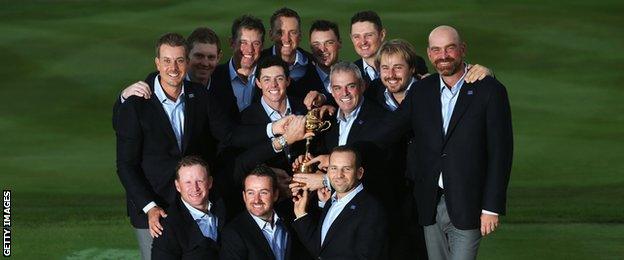
Europe's Ryder Cup team beat the USA 16.5-11.5 in 2014
"It was a phrase we used throughout the week: remember the geese.
"I'd never worked with superstars so dealing with the likes of Rory McIlroy and how he was going to feel in that situation was alien to me. Sir Alex is the one who I thought could help me with that.
"He spoke to the caddies before he spoke to the players, which was great. It was a lot of fun for them and made them feel included, because they were a big part of what we did. I could hear the laughter coming from the caddies' room so I knew it was going well.
"When he came in he knew every player's name and addressed everyone personally.
"When we won, this perfect V of geese flew right over our heads and over the clubhouse."
Tony Blair - Former British Prime Minister
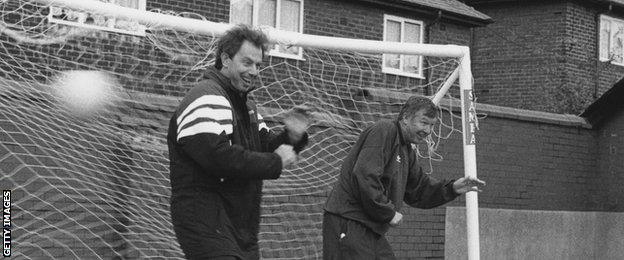
Tony Blair (left) was British Prime Minister from 1997 to 2007
"We would talk about man-management and I would say, 'look, such and such an individual may be brilliant but he is very, very tough and I don't know quite what to do about it'.
"Alex - because this is how he runs his soccer teams - would just say, 'get rid of them'. I'd say, 'that is all very well, but how would you be if you got rid of a player but still found them in the dressing room every day?'
"'Yeah, that would definitely be a problem', he'd say.
"We weren't talking about an actual individual, it was a hypothetical case, but his attitude was that it doesn't matter if he is your best player - if he is difficult, put him out of the room."
His former players - Rio Ferdinand, Ryan Giggs and Cristiano Ronaldo
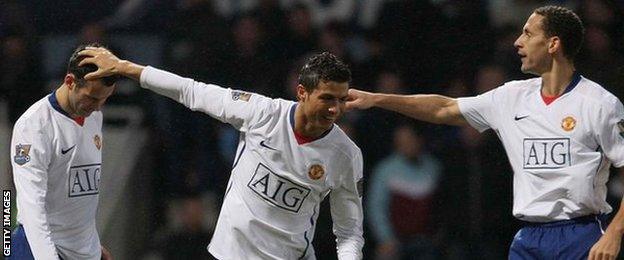
Ryan Giggs (left) played under Ferguson for 23 years
Ferdinand: "There is a dinner lady at United called Carol - she hammers him. 'What you got on? What is that?'
"He would go back at her and talk about her hair or something. That is the way he is. People don't see that side of him but he was really good like that."
Archive: Ferguson embarks on Man Utd journey in 1986
Giggs: "He had this unbelievable ability to remember everyone's name. He knows Kath on reception and the laundry girls and the chefs, the cleaners.
"You have 65-70 players, plus the schoolboys, which is another 30 or 40, and he knew them all because he took an interest in what they were doing and how they were progressing.
On the subject of a squad trip to an SAS base, instigated by Ferguson: "They just pulled me out - me and Paul Ince - and there's cardboard cut-outs and we're the hostages - the cardboard cut-outs are the people that are holding us.
"We were sat there at the table and the next minute the lights go out and we heard 'get down, get down', which we instantly did. A couple of bullet sounds and the lights go on.
"Next to us are four or five soldiers, night goggles on. It was a great experience. One we never forgot."
Ferguson says emotional farewell
Ronaldo: "Everyone loves him at the club. He invites everyone to come for lunch, for a cup of tea. It was a family with him.
"When my dad was sick in London, in hospital. It was bad, in a coma. I said, 'boss I don't feel good, I want to see my dad' and we had a key moment in the Champions League.
"He said to me, 'Cristiano, you want to go one day, two days, a week, you go. I will miss you here because you are important but your dad is first place'.
"When he told me that, I thought this guy was unbelievable. He was the father of football for me."
And finally... Ferguson on Liverpool's 1996 FA Cup final suits
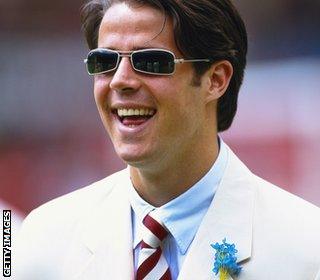
United beat Liverpool 1-0 in the 1996 FA Cup final
"Why did they do that?
"I said to [assistant] Brian Kidd, '1-0', because of that.
"What do you call it: arrogance? Over-confidence? It was absolutely ridiculous.
"White suit, blue shirt, a red and white tie and a blue flower. Who designed that? They say it was Armani... bet his sales went down.
"But you know the most telling part of that? [Liverpool's manager and assistant manager] Roy Evans and Ronnie Moran had black suits on. I think they were embarrassed.
"Liverpool Football Club is a great club. They have won more European Cups than Manchester United. That didn't represent Liverpool."
Sir Alex Ferguson: Secrets of Success is on BBC One on Sunday, 11 October at 22:30 BST.
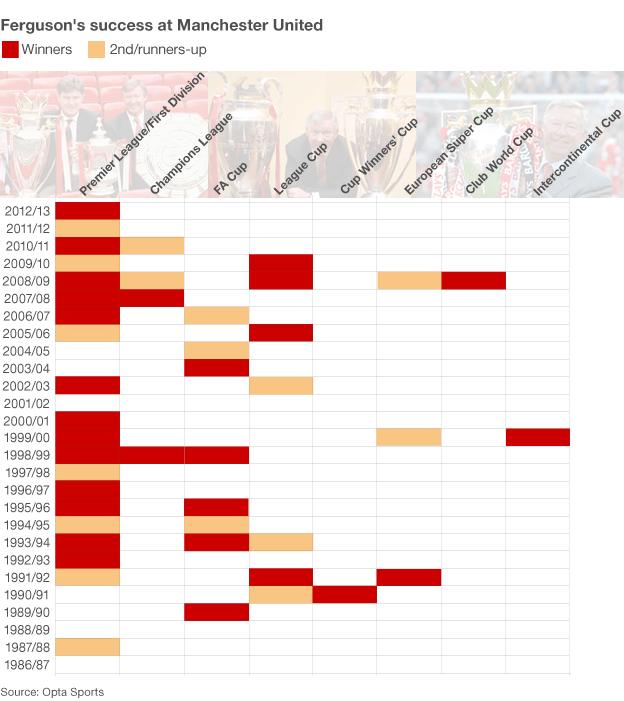
- Published6 October 2015
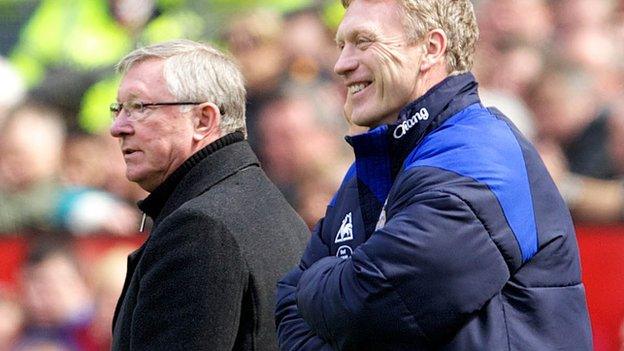
- Published6 October 2015
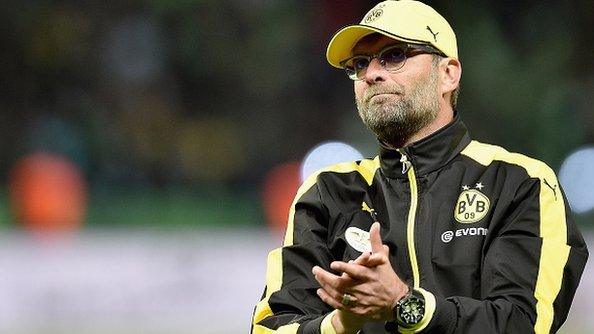
- Published5 October 2015
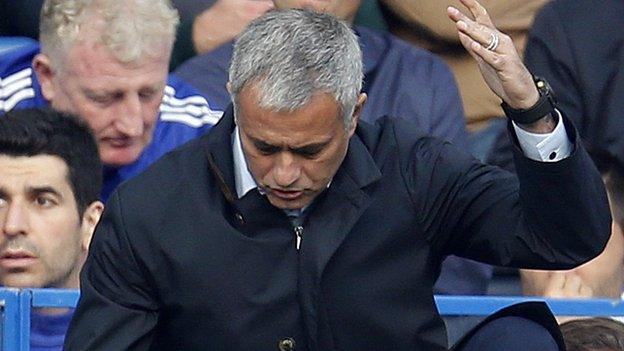
- Published5 October 2015
- Published12 May 2013
- Published7 June 2019

- Published20 June 2016
